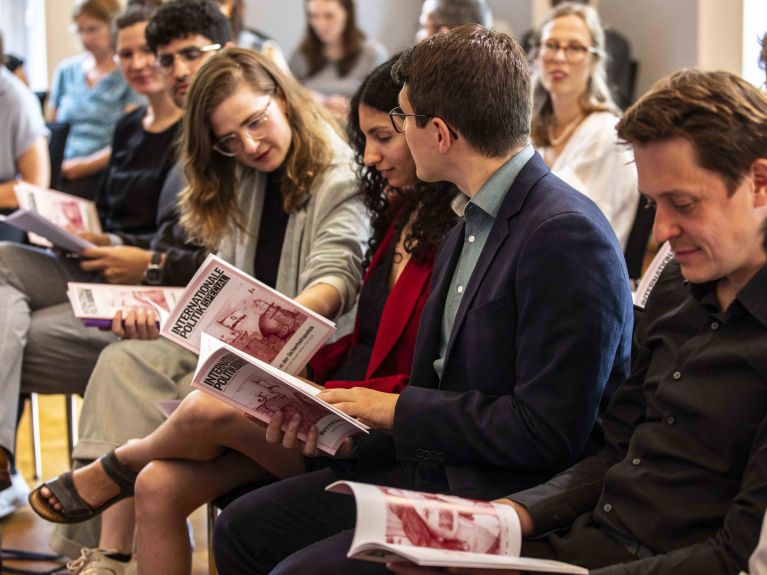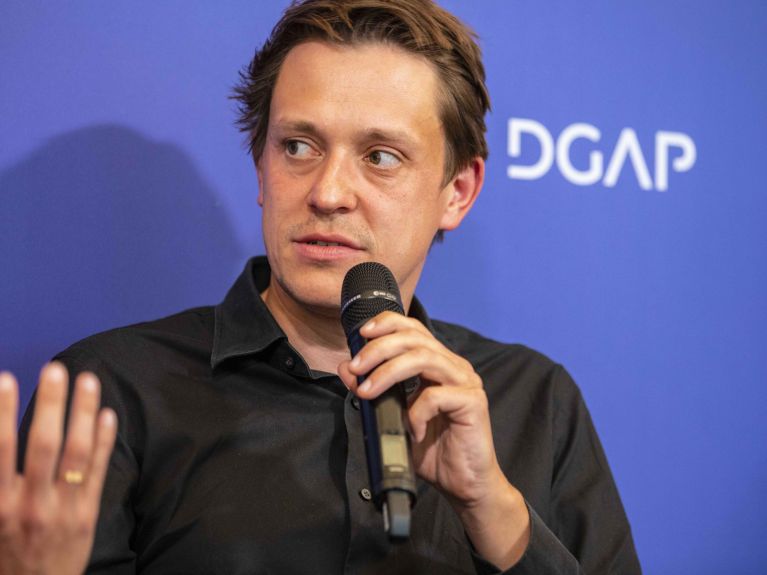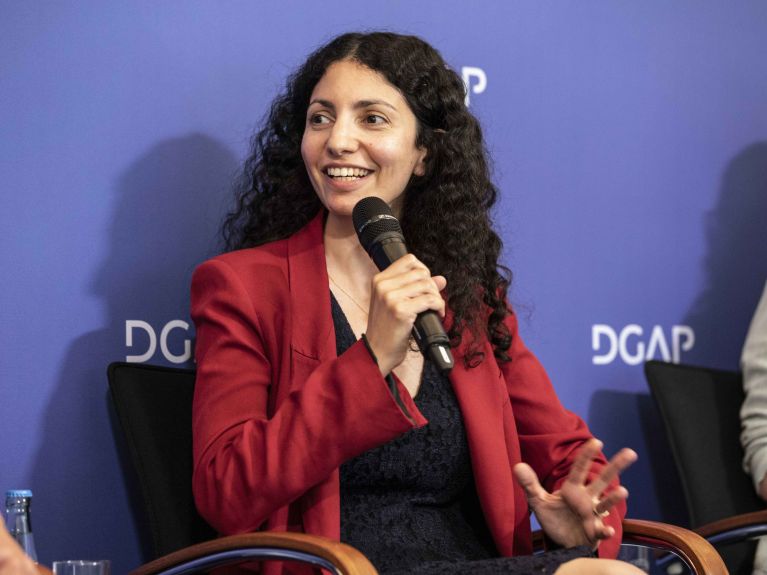Triggering constructive debates
German-Israeli dialogue: how young media professionals develop new perspectives on security policy issues thanks to the Sylke Tempel Fellowship programme.

What form should a modern defence policy take? On which guiding principles should it be based? Questions relating to security have a major impact on society and people’s lives - and pose challenges for numerous countries in view of the multiple crises and conflicts. The German-Israeli Future Forum Foundation (DIZF) has therefore decided to address the topic of “Values in Security Policy”: In the year 2023/2024 of the Sylke Tempel Fellowship it supported seven young media professionals who, thanks to the funding provided, were able to research the theory and practice of feminist foreign policy, security policy discourse in Israel and the role of women in the Israeli military, among other topics. Their articles were published in a special edition of the foreign policy magazine Internationale Politik (IP). With workshops focusing on content and methods, plus the final event in Berlin in late June 2024, the DIZF also provided the fellows with opportunities for continuing education, reciprocal exchange and discussion.

Challenges posed by global crises and conflicts
“For me, it was especially the seminar by an investigative journalist that I found really fascinating and informative,” explains the fellow Marcel Laskus, who is an editor with German daily Süddeutsche Zeitung. The research he conducted during his Sylke Tempel Fellowship took him to the Malkia kibbutz near the border with Lebanon – on 6 October 2023, one day before the Hamas terrorist attack. “The attack highlighted once again how relevant the topic of security policy is,” he says. “Israel, which always gives the highest priority to defending its territory, was suddenly vulnerable and seriously hit.” In Germany, on the other hand, the war in Ukraine has in his view led to many people rethinking their pacifist disarmament stance. “I am interested in how countries and people deal with such seismic upheavals,” says Laskus.
The Sylke Tempel Fellowship
In memory of the German political scientist, journalist and author Dr Sylke Tempel (1963– 2017), a Middle East correspondent and an extraordinary voice in German foreign policy, the DIZF has been awarding the Sylke Tempel Fellowship since 2019. The one-year research fellowship shines a spotlight on topical developments in Israeli and German foreign and security policy with themes such as “China’s Influence on Israel and the Middle East” or “The Triangular Relationship between Germany, Israel and the USA”. It is aimed at media professionals in both countries who are aged between 18 and 45. The American Jewish Committee Berlin (AJC), Women in International Security Deutschland e.V. (WIIS.de) and the magazine Internationale Politik (IP) are its cooperation partners.
This was also the topic Laskus explored during his Sylke Tempel Fellowship. In his article “Israel’s Left-Wing Legacy” he investigates why the workers’ party Awoda is no longer able to gain traction with its progressive foreign and security policy in Israel. “The party was founded 56 years ago by Golda Meir, among others, and built up the country, governed it for decades and heavily influenced it,” explains Laskus. “Since the failure of the Oslo Accords in the mid-1990s, however, people no longer trust in its competence in the field of security policy, with the result that it has now become all but meaningless.” The fact that Awoda has any seats in parliament at all is thanks to its longstanding voters, some of whom Laskus interviewed shortly before the Hamas attack at Malkia kibbutz. “Although the Hezbollah positions are just a few kilometres away from their homes, local residents were very relaxed at the time and believed firmly in peace with the Palestinians - I found that very impressive,” he says. “Though the events of 7 October 2023 shocked the entire country, they left these people particularly bewildered, in my view. I often thought about them after returning to Germany.”

“The scholarship offered me new opportunities for collaboration”
Elianne Shewring, another fellow, has a different view of Israel and its ability to deal with the threat. An Israeli with a bachelor’s in computer science and a master’s in international security from Massey University in New Zealand, she has called Berlin her home since 2019 and works as a researcher for Mitvim, the Israeli Institute for Regional Foreign Policies. During her Sylke Tempel Fellowship year, she studied feminist foreign policy and its possible impact on the country’s security. “This topic is very close to my heart,” she explains. “Thanks to the fellowship, I had the chance to engage extensively with it and to articulate my own ideas about it.” Another advantage of the fellowship, she says, is the wide range of contacts it provides: with other fellows and with Israeli security experts and researchers who Shewring interviewed. “That offered me new opportunities for collaboration and learning.”
Feminist approaches in international security policy
In her article “Women, Peace and Security”, she concludes that involving women in security matters and political decision-making processes has huge advantages and results in robust solutions to urgent challenges. “Women tend to look at the causes of conflicts and to take into account all kinds of different aspects, such as education systems and economic circumstances,” she explains. “They also consider the human factor in their decisions, such as civil matters or the effects security policy has on family life, children and marginal groups.” In her analysis, Shewring reveals how structural and cultural barriers and patriarchal values hinder the development of an inclusive security policy. Her conclusion: “To achieve gender equality in this area, a comprehensive transformation of society is necessary, “ she explains. “I hope that my publication will trigger a discourse on this in my home country.”


